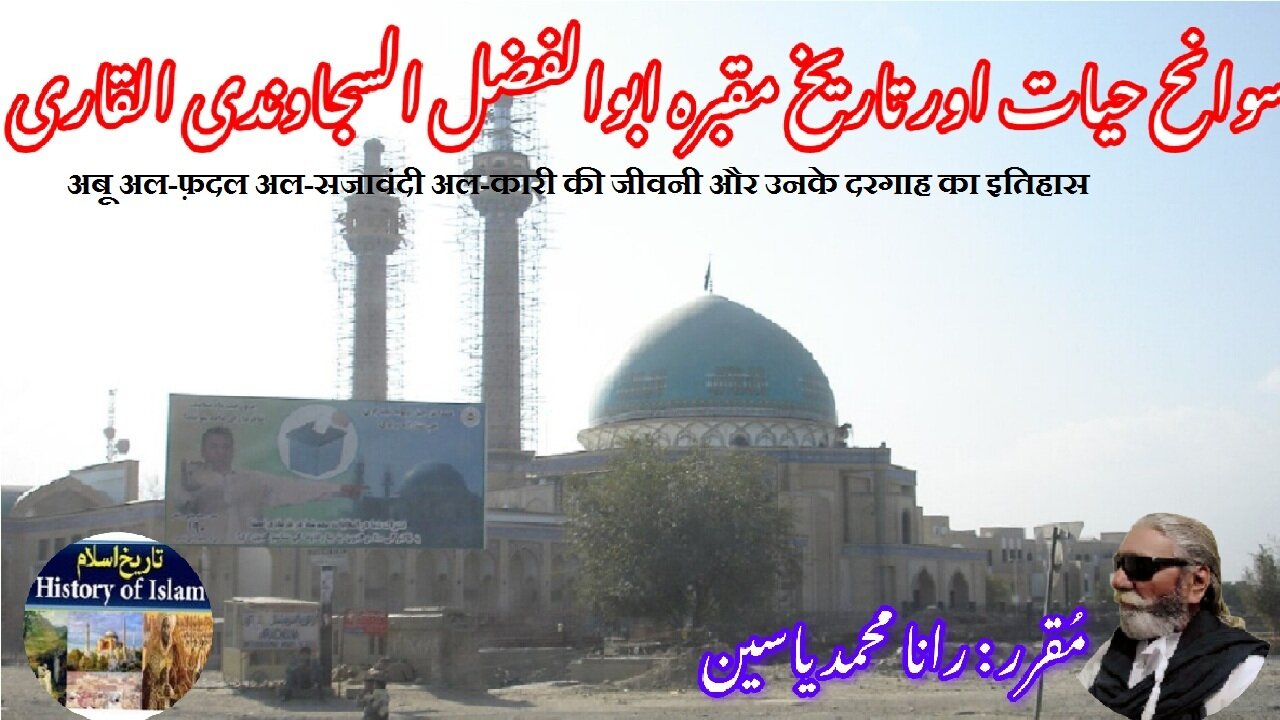Premium Only Content

Abu al-Fazl Al-Qari अबू अल-फ़ज़ल अल-कारी ابو الفضل سجاوندی القاری کی سوانح عمری اور مزار کی تاریخ
@islamichistory813 #abualfazl #assajawandi #alqari #sufisaint #culturalheritage #biography #islamicmysticism #shrine #islamicphilosophy #historicalfigures
Biography of Abu al-Fazl as-Sajawandi al-Qari and the history of his shrine
Dekhti Aankhooon aur sountay kaanoon ko Asslamoalaikum, sisters, brothers friends and elders, in informative series videos of Islamic ascolars, sufisaints, cultural heritages, islamic philosophys, islamic mysticisms and historical figures. today we are describing biography of Abu al-Fazl as-Sajawandi al-Qari and the history of his shrine.
Abu Abdullah Muhammad ibn Abu Yazid Tayfur Sajavandi Ghaznavi, more widely known as Abu al-Fazl as-Sajawandi al-Qari, holds a significant place within the rich history of Islamic mysticism and Sufism. Although many details of his life remain elusive due to the lack of definitive historical sources, his contributions to Sufism, Quranic scholarship, and spirituality have made him an influential figure in the history of Islamic thought. His legacy has persisted through the centuries, particularly through his shrine and the reverence with which Sufis and spiritual seekers regard him.
Abu Abdullah Muhammad ibn Abu Yazid Tayfur Sajavandi Ghaznavi, often referred to by his epithet Abu al-Fazl as-Sajawandi al-Qari, was born in Sajavand, an ancient town in the region that is now part of modern-day Iran, specifically within the Isfahan province. Sajavand, historically known for its religious significance, served as a hub of Islamic scholarship and mysticism, making it an ideal environment for someone like Abu ?Abdullah to be influenced by intellectual and spiritual currents of his time.
The exact date of his birth is not clearly recorded in historical texts, but based on contextual evidence, it is generally believed that he was born in the early 10th century, a period marked by intellectual flourishing and the consolidation of Islamic civilization. His family background and early education remain somewhat ambiguous, but it is widely accepted that he received a comprehensive education in Islamic theology, Quranic sciences, and mysticism. His education, like that of many other notable Sufi scholars, would have included learning from established scholars and participating in intellectual and spiritual discussions within his community.
The town of Sajavand, though not widely known today, was a center of Islamic learning, and it likely provided a fertile ground for Abu ?Abdullah’s spiritual growth. Growing up in an area that was influenced by Persian mysticism and Islamic teachings, he was exposed early to the ideas and practices of Sufism, which would go on to define much of his spiritual path. He likely studied the Quran intensively, as indicated by his later title "al-Qari" (meaning “the reciter”), which suggests that he had mastered the art of Quranic recitation and had a deep understanding of the sacred text.
Abu ?Abdullah Muhammad ibn Abu Yazid Tayfur Sajavandi Ghaznavi’s spiritual journey was deeply influenced by the Sufi tradition. Sufism, at its core, emphasizes the personal experience of the Divine through direct communion with God, often facilitated by practices such as dhikr (remembrance of God), asceticism, and meditation. From an early age, Abu ?Abdullah was drawn to this inward, mystical path, which led him to adopt a life devoted to self-purification, ascetic practices, and a quest for closeness to God.
His involvement with Sufism was not merely theoretical but deeply experiential. As a young man, he would have immersed himself in the study of Sufi texts and teachings under the guidance of established Sufi masters of his time. He became renowned for his deep understanding of Islamic spirituality and mystical thought, which would later form the foundation of his own unique contributions to the Sufi tradition.
Abu al-Fazl as-Sajawandi al-Qari, as he is also known, was particularly influential in the areas of Quranic recitation and its spiritual interpretation. His expertise in the Quran was not just in the technicalities of reciting the text, but also in understanding its deeper, esoteric meanings—one of the hallmarks of Sufi scholarship. He is often remembered for his unique ability to engage with the Quran on a spiritual level, integrating its recitation with profound mystical insights.
Abu ?Abdullah’s teachings and practices were characterized by an emphasis on asceticism, devotion to God, and the cultivation of divine love. He taught that true knowledge of God could only be attained through a personal, transformative experience, and that the purification of the soul was an essential step in this journey. His devotion to God, coupled with his spiritual discipline, made him a respected figure among his peers and an influential teacher to a growing number of followers.
One of the key elements of Abu ?Abdullah’s Sufi teachings was his emphasis on the idea that the external world is but a distraction from the internal quest for God. For him, the path to spiritual enlightenment was through detachment from worldly affairs and immersion in the remembrance of God. This philosophy made him an ardent proponent of ascetic practices, which he viewed as essential for the spiritual purification of the heart and soul.
The precise date and circumstances of Abu ?Abdullah Muhammad ibn Abu Yazid Tayfur Sajavandi Ghaznavi’s death are not definitively recorded in historical texts, as is often the case with figures from this period. However, it is generally believed that he passed away sometime during the early 11th century. His death marked the end of his physical presence in the world, but his spiritual influence did not cease. His teachings, especially his focus on divine love, asceticism, and the importance of the inward journey to God, continued to resonate deeply with Sufi practitioners and scholars who came after him.
His spiritual legacy was carried on through his disciples and followers, who went on to spread his teachings throughout the Islamic world. The impact of his life and work on the Sufi tradition cannot be overstated. He was one of the many figures who helped to shape the mysticism and spirituality of the medieval Islamic world, laying the groundwork for future generations of mystics who would continue to build on his ideas.
After his death, Abu ?Abdullah Muhammad ibn Abu Yazid Tayfur Sajavandi Ghaznavi’s tomb became a revered site for pilgrims and spiritual seekers. His shrine is located in the town of Sajavand, which is situated in present-day Isfahan province in Iran. The shrine became a center of devotion and reflection, drawing people from all walks of life who sought to honor the memory of this esteemed mystic and to benefit from his spiritual influence.
The location of his shrine in Sajavand, a town with a rich history of Islamic scholarship and mysticism, further solidified its significance as a spiritual center. The town itself was a hub of learning and intellectual exchange, which added to the spiritual and academic prestige of the shrine. Over the centuries, the shrine has been visited by countless pilgrims, students, and Sufi practitioners, all of whom sought to connect with the teachings and legacy of Abu ?Abdullah.
Throughout the centuries, the shrine has undergone several renovations and reconstructions, particularly during periods of political and cultural renewal. The Safavid dynasty, for instance, was known for its support of Sufism and its investment in religious infrastructure, including the renovation of shrines of notable Sufi figures. These renovations contributed to the aesthetic and spiritual atmosphere of the shrine, ensuring that it remained a place of devotion and pilgrimage.
The architectural design of the shrine reflects the grandeur and elegance of Persian Islamic architecture, incorporating elements such as intricate tile work, calligraphy, and detailed decorative patterns that are emblematic of the period. The mausoleum itself is an elegant structure, standing as a testament to the significance of Abu ?Abdullah’s legacy within the broader context of Islamic spirituality.
Today, the shrine of Abu ?Abdullah Muhammad ibn Abu Yazid Tayfur Sajavandi Ghaznavi continues to attract pilgrims from all over the world. Visitors come not only to pay their respects but also to meditate, reflect, and seek spiritual guidance in the presence of this revered Sufi mystic. The shrine remains a vibrant center of spiritual activity, where Sufi practices such as dhikr (remembrance of God) and contemplation continue to be performed by devotees who follow in the mystic’s path.
Abu ?Abdullah Muhammad ibn Abu Yazid Tayfur Sajavandi Ghaznavi, also known as Abu al-Fazl as-Sajawandi al-Qari, was a prominent Sufi mystic, Quranic scholar, and spiritual guide. His life, though shrouded in mystery, left an indelible mark on the development of Sufism and the broader Islamic intellectual tradition. His emphasis on divine love, asceticism, and spiritual purification continues to inspire followers and seekers of truth to this day. The shrine in Sajavand, where he is buried, remains a key pilgrimage site for those wishing to connect with his teachings and to pay homage to his legacy. Through his contributions to Islamic mysticism, Abu ?Abdullah’s life and work continue to resonate, ensuring his place in the history of Islamic spirituality.
With this, we seek your permission until tomorrow, tomorrow we will describe the biography of Muhammad Ilyas Attar Qadri and the history of his Shrine. Allah Hafiz.
===========================================
-
 1:47
1:47
ISLAMIC HISTORY
8 hours agoSurah At Taubah Verse No 67 تلاوت َسورة اَلتَّوْبَة اردو اور انگریزی ترجمے کے ساتھ آیت نمبر
-
 3:07:24
3:07:24
FreshandFit
9 hours agoPrivileged Nigerian Thinks Women Created Everything: HEATED DEBATE
141K76 -
 5:57:27
5:57:27
SpartakusLIVE
9 hours agoNEW Update - BROKEN Attachment || Viewers REJOICE at the long-awaited Return of Their KING
74.9K -
 2:06:31
2:06:31
TimcastIRL
9 hours agoTrump To Deploy National Guard To Portland, Antifa Has Been WIPED OUT | Timcast IRL
189K152 -
 2:30:00
2:30:00
Laura Loomer
10 hours agoEP142: Loomer Prompts Calls For FBI To Investigate Palestinian Youth Movement
49.8K19 -
 1:26:34
1:26:34
Man in America
13 hours agoExposing the Cover-Up That Could Collapse Big Medicine: Parasites
56.3K23 -
 4:53:00
4:53:00
CHiLi XDD
8 hours agoTekken Fight Night
30K1 -
 9:25:57
9:25:57
ItsLancOfficial
14 hours agoFREAKY FRIDAY-GETTING FRIED-WELP! #TOTS
30.1K3 -
 1:09:11
1:09:11
Sarah Westall
9 hours agoRead the Signs: Are We Already Operating in a New Financial System? w/ Andy Schectman
42K8 -
 1:32:53
1:32:53
Flyover Conservatives
13 hours agoRicky Schroder Exposes How Hollywood Planted Him as a Child Star | FOC Show
54.8K14